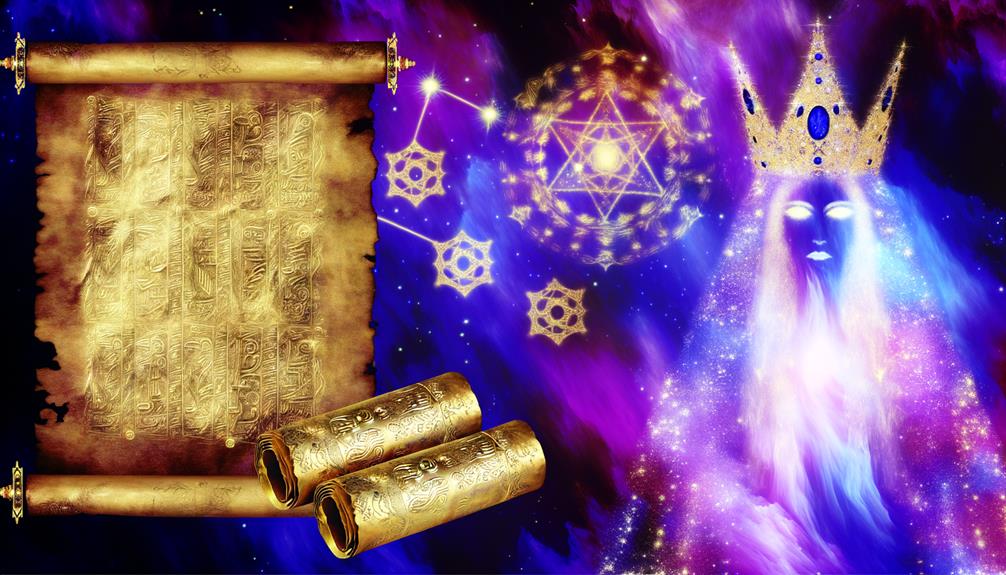Meaning of the Name Balthazar
The name Balthazar originates from the Akkadian language, meaning "Bel protect the king," reflecting its deep roots in ancient Mesopotamian culture and divine safeguarding. Biblically, Balthazar is one of the Magi who presented myrrh to infant Jesus, symbolizing suffering and death, thereby adding a profound theological dimension to the name.
Historically, its significance spans Babylonian and Persian traditions, fostering an emblematic sense of protection and divinity. In literature and pop culture, Balthazar embodies wisdom and resilience, maintaining an ethereal appeal.
Insights into its enduring legacy across epochs and civilizations await further exploration.

Key Takeaways
- Balthazar means 'Bel protect the king' in Akkadian, emphasizing divine safeguarding.
- Connected to the ancient Mesopotamian god Marduk with protective connotations.
- One of the Magi in the Bible, symbolizing Jesus' future suffering with the gift of myrrh.
- Historically significant in Babylonian and Persian traditions, symbolizing protection and divinity.
- Frequently appears in literature and pop culture, often representing wisdom and resilience.
Etymology and Origins
The name Balthazar originates from the Akkadian language, specifically derived from 'Bel-shar-uzur,' which translates to 'Bel protect the king.'
This etymology underscores a connection to ancient Mesopotamian culture, where 'Bel' was a title for the god Marduk, the chief deity of Babylon.
The suffix 'shar-uzur,' meaning 'protect the king,' signifies a divine safeguarding role.
This nomenclature was emblematic of the era's theocratic political systems, where divine favor was a cornerstone of governance.
The linguistic evolution of Balthazar into various languages, including Hebrew and Greek, maintains its core protective connotation.
Understanding its Akkadian roots provides valuable insight into historical naming conventions and the intertwining of divine and royal domains in ancient civilizations.
Biblical Significance
In biblical texts, Balthazar is traditionally identified as one of the Magi who visited the infant Jesus, bearing gifts. The Magi, often referred to as the Wise Men or Kings, are central figures in the Nativity narrative found in the Gospel of Matthew. Balthazar's gift of myrrh symbolizes suffering and death, prefiguring Jesus' crucifixion. This adds profound theological significance to his role, emphasizing the prophetic recognition of Jesus' future sacrifice.
| Aspect | Details |
|---|---|
| Gift | Myrrh |
| Symbolism | Suffering and Death |
| Theological Impact | Prefigures Jesus' crucifixion and sacrifice |
This table elucidates Balthazar's contribution and its symbolic meaning within the Christian tradition, underpinning the depth of his biblical significance.
Historical Context
The name Balthazar is mainly recognized from its biblical references. It also holds significant ancient cultural importance. Historical records indicate its prevalence in Babylonian and Persian traditions. In these cultures, the name symbolized protection and divinity.
This multifaceted historical context enriches our understanding of the name's enduring legacy across different epochs and civilizations.
Biblical References
Among the various historical contexts, Balthazar prominently appears in the biblical narrative, particularly in the Book of Daniel. The name is associated with Belshazzar, the last king of Babylon, who is infamously known for the 'writing on the wall' incident. This event signifies divine judgment and presages the fall of Babylon to the Medes and Persians.
Key points related to Balthazar in the Bible include:
- Belshazzar's Feast: The opulent banquet where a mysterious hand writes on the wall, interpreted by Daniel.
- Divine Judgment: The prophetic message 'Mene, Mene, Tekel, Upharsin' indicating Belshazzar's downfall.
- Historical Verification: Corroboration from Babylonian records affirming Belshazzar's existence and reign.
This narrative embeds Balthazar deeply within Judeo-Christian theological discourse.
Ancient Cultural Significance
Frequently, the name Balthazar is examined within the broader framework of ancient Near Eastern cultures, where it held significant connotations of nobility and divine favor.
Originating from the Akkadian 'Bel-shar-usur,' which translates to 'Bel protect the king,' the name underscores the protective and sovereign influence of the god Bel (or Marduk).
This association with divine guardianship and kingship reflects the cultural emphasis on the divine right of rulers in ancient Mesopotamia.
In Babylonian contexts, names invoking deities were not mere labels but were believed to confer divine protection and legitimacy.
Consequently, the name Balthazar would have been perceived as an emblem of divine endorsement, carrying implications of authority and sanctity within the sociopolitical and religious fabric of the time.
Literary References
Numerous literary works have embedded the name Balthazar within their narratives, often imbuing it with rich symbolic significance and historical connotations. This name appears across a diverse range of texts, reflecting various thematic elements and character archetypes.
In examining its literary usage, several notable instances stand out:
- The Bible: The name Balthazar is traditionally associated with one of the Magi, symbolizing wisdom and the search for divine truth.
- Shakespeare's 'Romeo and Juliet': Balthasar, a servant to Romeo, represents loyalty and the bearer of pivotal news.
- G.K. Chesterton's 'The Ballad of the White Horse': It features Balthazar as a symbol of resilience and the eternal struggle between good and evil.
These references highlight Balthazar's multifaceted role in literary history.
Pop Culture Appearances
In contemporary pop culture, the name Balthazar frequently emerges in various media forms, reflecting both historical depth and modern reinterpretations. This name appears in numerous television series, films, and literature, often endowed with a sense of mystery and gravitas.
For instance, Balthazar Blake, a character in the film 'The Sorcerer's Apprentice,' epitomizes the archetypal wise mentor. Similarly, the TV series 'Supernatural' introduces Balthazar as a rogue angel, highlighting the name's ethereal connotations.
Such portrayals not only draw on the name's historical and biblical roots but also adapt it to fit contemporary narratives. Through these diverse incarnations, the name Balthazar continues to resonate, underscoring its enduring appeal and multifaceted significance in modern storytelling.
Modern Usage and Trends
The contemporary use of the name Balthazar reveals a significant trend towards its adoption in diverse contexts, ranging from popular media to personal naming choices. This resurgence can be attributed to various factors, including its unique phonetic appeal and historical significance.
Analytical scrutiny of current trends indicates that Balthazar has transcended its traditional confines, finding resonance in modern society. Especially, the name has gained traction in:
- Literature and Film: Characters named Balthazar frequently appear, adding a sense of depth and mystique.
- Naming Practices: Parents seeking distinctive names increasingly choose Balthazar for its rarity and classical roots.
- Cultural References: The name appears in various cultural and artistic works, enhancing its contemporary relevance.
This multifaceted usage underscores Balthazar's enduring and evolving appeal.
Conclusion
To sum up, the name Balthazar, with its ancient origins and rich historical tapestry, has journeyed through biblical, historical, literary, and modern contexts.
Particularly, in the United States, the name's popularity has experienced a resurgence, with a 38% increase in baby name registrations in the last decade.
This data highlights a renewed cultural interest, indicating a cyclical appreciation for names with deep historical and etymological importance.






